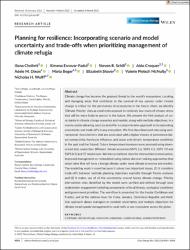/admin/item?itemID=19e95ce7-69be-4081-8278-fca9a8df81d0
Planning for resilience : incorporating scenario and model uncertainty and trade-offs when prioritizing management of climate refugia

Ver/
Tipo de acceso
AbiertoTipo de Material
ArtículoTipo de Contenido
Investigación científicaMateria
Cambio climáticoRecursos marinos
Arrecifes de coral
Problemas ambientales
Conservación ambiental
Idioma
InglésAudiencia
Técnicos, profesionales y científicosColección
- Investigación ambiental [1725]
Metadatos
Mostrar el registro completo del ítem| Sinopsis: | Climate change has become the greatest threat to the world's ecosystems. Locating and managing areas that contribute to the survival of key species under climate change is critical for the persistence of ecosystems in the future. Here, we identify ‘Climate Priority’ sites as coral reefs exposed to relatively low levels of climate stress that will be more likely to persist in the future. We present the first analysis of uncertainty in climate change scenarios and models, along with multiple objectives, in a marine spatial planning exercise and offer a comprehensive approach to incorporating uncertainty and trade-offs in any ecosystem. We first described each site using environmental characteristics that are associated with a higher chance of persistence (larval connectivity, hurricane influence, and acute and chronic temperature conditions in the past and the future). Future temperature increases were assessed using downscaled data under four different climate scenarios (SSP1 2.6, SSP2 4.5, SSP3 7.0 and SSP5 8.5) and 57 model runs. We then prioritized sites for intervention (conservation, improved management or restoration) using robust decision-making approaches that select sites that will have a benign climate under most climate scenarios and models. The modelling work is novel because it solves two important issues. (1) It considers trade-offs between multiple planning objectives explicitly through Pareto analyses and (2) It makes use of all the uncertainty around future climate change. Priority intervention sites identified by the model were verified and refined through local stakeholder engagement including assessments of local threats, ecological conditions and government priorities. The workflow is presented for the Insular Caribbean and Florida, and at the national level for Cuba, Jamaica, Dominican Republic and Haiti. Our approach allows managers to consider uncertainty and multiple objectives for climate-smart spatial management in coral reefs or any ecosystem across the globe. |
| Autor(es): | Chollett, Iliana
Escovar-Fadul, Ximena Schill, Steven R. Cróquer, Aldo Dixon, Adele M. Beger, Maria Shaver, Elizabeth Pietsch McNulty, Valerie Wolff, Nicholas H. |
| Año: | 2022 |
| Publicado: | Global Change Biology, 28(13), 4054-4068 |
| Citación: | Chollett, I., Escovar‐Fadul, X., Schill, S. R., Croóquer, A., Dixon, A. M., Beger, M., ... & Wolff, N. H. (2022). Planning for resilience: Incorporating scenario and model uncertainty and trade‐offs when prioritizing management of climate refugia. Global Change Biology, 28(13), 4054-4068. Recuperado de: |
| URI: | https://bvearmb.do/handle/123456789/3704
|
Texto completo del artículo
La consulta y descarga de este documento están sujetas a esta licencia: This is an open access article under the terms of the Creative Commons Attribution-NonCommercial License, which permits use, distribution and reproduction in any medium, provided the original work is properly cited and is not used for commercial purpose
© 2022 The authors. Global Change Biology published by John Wiley & Sons Ltd.
© 2022 The authors. Global Change Biology published by John Wiley & Sons Ltd.

